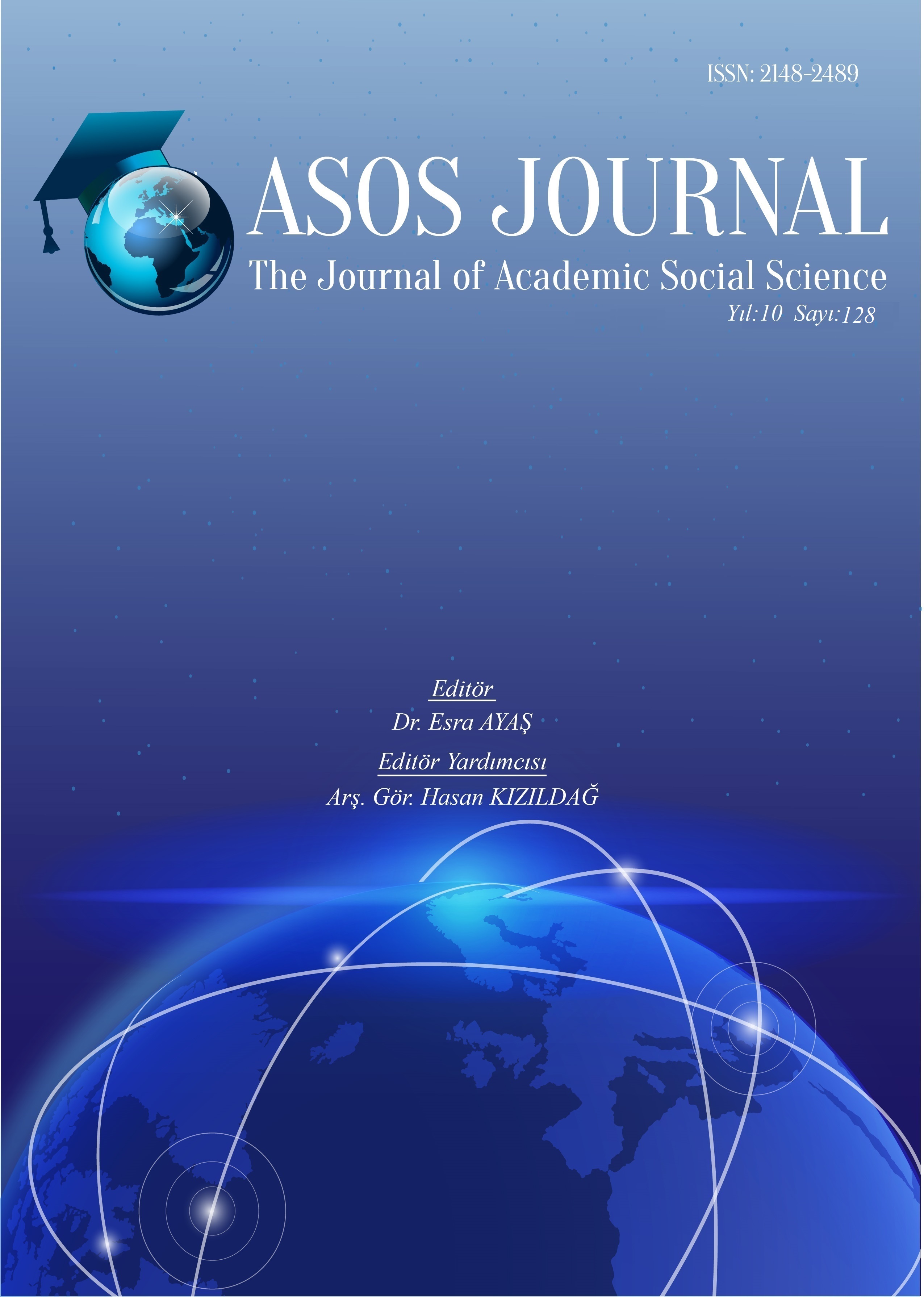Author :
Abstract
Bu çalışmada iç göçlerin yorumlanmasında kullanılan DİE ve TÜİK’in doğum yerine göre nüfus verilerinden faydalanılarak Türkiye’nin diğer illerine göç eden Muş doğumlu nüfusun değişim özellikleri araştırılmıştır. Sosyo-ekonomik, siyasal ve doğal faktörlerin etkisi sonucu insanlar doğdukları ya da ikamet ettikleri mekânları sürekli değiştirmişlerdir. İnsanların doğdukları ya da ikamet ettikleri mekânları sürekli değiştirmeleri nedeniyle nüfusun mekânsal dağılımında önemli değişiklikler olmaktadır. Göç hareketleri sonucu göç veren yerlerde nüfus azalırken, göç alan yerlerde ise nüfus artmaktadır. Göç hareketleri, nüfusun gelişimi ve mekânsal dağılımını etkilediği gibi, doğduğu yerde ikamet eden yerli nüfusun gelişimini ve mekânsal dağılımını da etkilemektedir. 1950-2020 yılları arasında Türkiye’nin diğer illerinde ikamet eden Muş doğumlu nüfusun mekânsal dağılımına bakıldığında sosyo-ekonomik, siyasal ve doğal faktörlerin etkisiyle Muş ili doğumlu nüfusun önemli oranda doğduğu yeri terk edip Türkiye’nin diğer illerine göç ettiği görülmektedir. Nitekim 1950 yılında Muş ili doğumluların %6,7’si Türkiye’nin diğer illerinde ikamet ederken, bu oran 2020 yılında %51,7’ye yükselmiştir. 1950-2020 yılları arasında Muş doğumluların en fazla ikamet ettiği illerin başında sosyo-ekonomik bakımdan gelişmiş iller olan İstanbul, İzmir, Bursa, Kocaeli, Ankara ve Aydın gibi iller gelmektedir.
Keywords
Abstract
In this study, the change characteristics of the population born in Muş province, which migrated to other provinces of Turkey, were investigated by making use of the population data according to the place of birth of DİE and TÜİK, which are used in the interpretation of internal migrations. People have constantly changed the places where they were born or where they resided as a result of the influence of socio-economic, political and natural factors. Due to the constant change of places where people are born or residing, there are significant changes in the spatial distribution of the population. As a result of migration movements, the population decreases in the places that migrate, while the population increases in the places that receive migration. Migration movements affect the development and spatial distribution of the population as well as the development and spatial distribution of the indigenous population residing in the place of birth. When we look at the spatial distribution of the Muş born population residing in other provinces of Turkey between 1950 and 2020, it is seen that the population born in Muş province has left its birthplace and migrated to other provinces of Turkey due to socio-economic, political and natural factors. In fact, 6,7% of the people born in Muş province in 1950 resided in other provinces of Turkey, which increased to 51,7% in 2020. Provinces such as Istanbul, İzmir, Bursa, Kocaeli, Ankara and Aydın, which are socio-economically developed provinces, are at the top of the provinces with the highest number of residents born in Muş between the years 1950-2020.
Keywords
- Adıgüzel, Y. (2016). Göç Sosyolojisi (1.Baskı). Nobel Yayıncılık.
- Akkayan, T. (1976). Göç ve Değişme. Edebiyat Fakültesi Basımevi.
- DİE. (1950-2000). Nüfusun Sosyal ve Ekonomik Özellikleri, İl Fasikülleri. (www.tuik.gov.tr).
- DİE. (1950-2000). Genel Nüfus Sayımları. (www.tuik.gov.tr).
- Günal, V. (2019). Muğla İlindeki Nüfusun Doğum Yerlerine Göre Bileşenleri ve Değişimi (1935-2017). K, Ulusoy (Ed.), 3. Uluslararası Avrasya Sosyal Bilimler Kongresi bildiriler kitabı içinden (ss. 917-927). Muğla.
- Günal, V. (2018). Van İli Nüfusunun Doğum Yerine Göre Bileşenleri. Turkish Studies, (13)18, 719-740. http://dx.doi.org/10.7827/TurkishStudies.14078
- Günal, V. (2016). Türkiye’deki Göçler Sonucunda İl Nüfuslarının Yapısında (Doğum Yeri Bağlamında) Meydana Gelen Değişimler (1950-2000). Turkish Studies, (11)13, 171196. http://dx.doi.org/10.7827/TurkishStudies.9757
- Günal, V. (2016). Türkiye Nüfusunun (1935-2000) Doğum Yerine Göre Değerlendirilmesi, Turkish Studies, 11/2, 499-534. http://dx.doi.org/10.7827/TurkishStudies.9191
- Kocaman, T. (2008). Türkiye’de İçgöçler ve Göç Edenlerin Nitelikleri (1965-2000). T.C. Başbakanlık Devlet Planlama Teşkilatı Sosyal Sektörler ve Koordinasyon Genel Müdürlüğü. Ankara
- Koç, H, Sağdıç, M. (2010). Göç Hareketinin Nüfusun Cinsiyet Ve Yaş Grubu Üzerine Etkisi (Sivas Örneği), Marmara Coğrafya Dergisi Sayı: 22, 295 – 324.
- Özgür, E.M. (1998). Türkiye Nüfus Coğrafyası. GMC Basın.
- Sönmez, E. (2010). Muş İlinde Nüfus Hareketlerinin Nedenleri ve Sonuçları, Türk Coğrafya Dergisi, Sayı 55, 45–57.
- TUİK. (2007-2021). Adrese Dayalı Nüfus Kayıt Sistemi. (www.tuik.gov.tr).
- Yakar, M. (2017). Yerlilikten” “Göçmenliğe” Doğru: Türkiye’de İç Göçün Doğum Yeri Verisine Göre Gelişimi. F. Arslan (Ed.) Türkiye Coğrafyası Araştırmaları Prof. Dr. Mustafa Elibüyük’e Armağan kitabı içinden (s.373-398). Pegem Akademi. (https://www.researchgate.net/publication/318542357_YERLILIKTEN_GOCMENLIG E_DOGRU_TURKIYE'DE_IC_GOCUN_DOGUM_YERI_VERISINE_GORE_GELIS IMI, Erişim Tarihi: 10.03.2022)
- Yakar, Eteman, F.S. (2017). Türkiye'de İller Arası Göçlerin Nodexl İle Sosyal Ağ Analizi, Göç Dergisi, Cilt 4, Sayı 1, 82-109.
- Yakar, M. (2015). Türkiye'nin İç Göç Paterni: Kim Nerede İkamet Ediyor? Nereye Kayıtlı? Ege Coğrafya Dergisi, 24/1, 15-38, İzmir.
